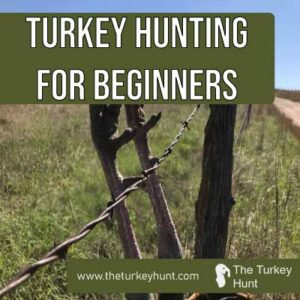Beginner turkey hunting is a blast. With so many things to learn, and so much to see, learning how to turkey hunt for beginners is vital. After all, if you are going to learn to do something, you might as well learn how to do it right. This is where The Turkey Hunt comes in, and helps you figure out all you need to know when it comes to being a rookie at turkey hunting.
Don’t stress, everyone who has ever hunted was a beginner at some point in their life.
Turkey Hunting for Beginners
Turkey hunting, as a beginner, is a challenging (and rewarding) activity that requires patience, planning, and an understanding of wildlife.
Did you know that turkey hunting is one of the most popular forms of hunting in the United States? It is an exciting sport and can be enjoyed by just about anyone.
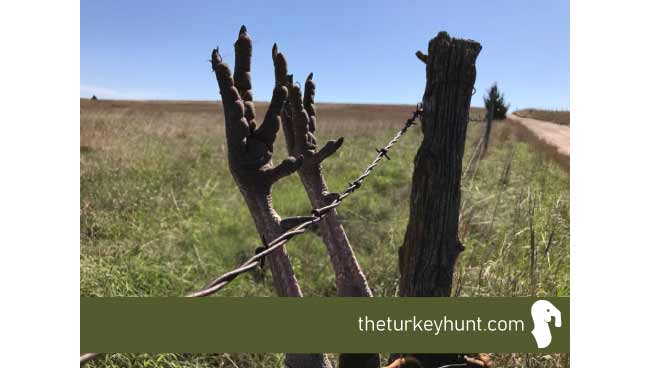
Let’s take some time to go over turkey hunting, what you’ll need for basic hunting adventures, and how to improve yourself as a huntsman. There are few things cooler than a successful turkey hunt, and we want to make sure you’re as squared away as possible for your first hunt.
How to Turkey Hunt
After getting your tag and state license, the first step in turkey hunting for beginners is finding a place where you can hunt turkeys. The best places to do this are fields or woods with little cover, as turkeys will stay away from these areas if they feel threatened by other animals or humans. Some people prefer to scout for birds if they are in an area they don’t know well.
Scouting for Birds
Scouting is a fun part of turkey hunting! It can be done outside of hunting season, too. The whole purpose of scouting out turkeys is to know their movement patterns, roosting locations, and places they go to look for food before you go out on your actual hunt. If you can nail down these locations, you will most likely shoot a nice sized bird (as long as you’re a good shot).
Related: Can You Hunt With a Drone?
1. Preparing Your Hunting Spot
After you have decided on your area to hunt, the next step is finding a good spot to occupy. It would help if you tried to find a place with no glare or wind. If you’re looking to turkey hunt hunt from a blind, look for a spot that has enough open area to accommodate the size of your blind.
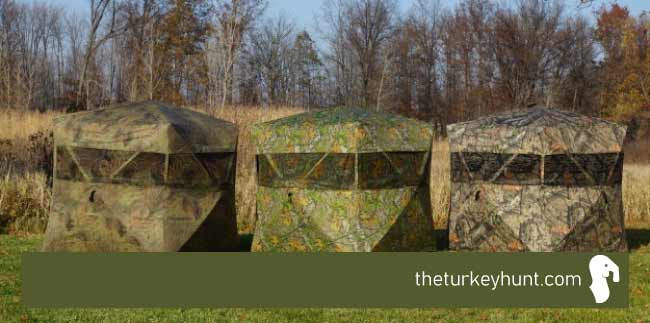
Once you’ve found your spot, consider setting up your decoy (if using one) or two. What I do is find a nice spot right on the edge of the wood line, and place the decoys about 20 yards into the field. This way, you have enough cover and concealment to hide yourself while the decoys are in plain view and can attract other turkeys.
Be sure to get into your spot before sunrise. Be as quiet as you can while moving in – some turkeys may be sleeping, and you don’t want to spook them when they are in their roost, otherwise you may have some problems when calling them in.
2. Calling In Your Birds
Once you have everything ready to go, and you are nice and comfortable in your spot, start to listen carefully. Usually, birds will start calling once the sun rises. You’ll hear all sorts of sounds when the forest comes to life. This is one of the coolest experiences ever!
A problem most beginners have is they start calling way too soon, and call way too often. Turkey calling is an art, and you will get better at it. As a general rule of thumb, only call a couple times every 30 minutes. If nothing calls back, they probably aren’t in your area, or aren’t interested in your calls. Over calling the birds will do more damage then good.
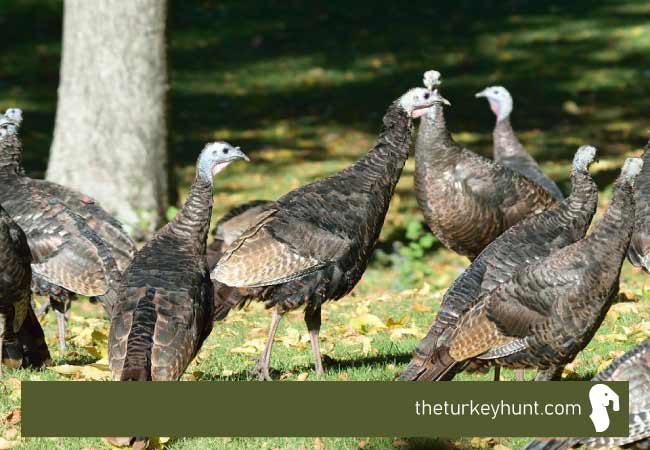
Try to learn your different calls, and get better at them in the off season. The better your turkey calling skills are, the more successful hunts you’ll have.
The goal is to coax in a nice, big gobbler my mimicking a hen. Once they are within shooting range, take your shot. Most beginners will be using a shotgun, and you’ll want to take a shot that is no more than roughly 40 yards out.
Pay Extra Close Attention
I cannot count the times where I thought there were no birds in my area, and I would look up to a flock of turkeys right in front of my face. They move fast, far, and silently.
Always, always pay attention to your fields of fire. They will, undoubtedly, sneak up on you when you least expect it.
3. Taking the Shot
When you feel like a bird worthy of shooting is within your shooting range, take a shot. Most people will aim their site picture at the neck/head of their target. This is the most humane way to kill a turkey.
Make sure your bird is within a comfortable range for you to shoot. Some people like to give a little cluck call to get the turkey to momentarily freeze and look. Once this happens – aim, exhale, and squeeze the trigger.
Related: Turkey Hunting Videos
Hopefully you’re a halfway decent shot, and get the bird!
4. Filling Out Your Tag
Immediately after your turkey goes down, try to fill out your tag. It will have information specific to your region, and the type of game (turkey, in this case) you are hunting. It is pretty self explanatory. You need to do this in a timely manner to remain legal.
Beginner Turkey Hunting Tips
Turkey hunting is an exciting experience, but it is not for everyone. Here are a few tips to help you be successful on your first turkey hunt:
Get Your Gear and Accessories Squared Away
Nothing is more important than getting your equipment and clothing right. There are many options, and knowing what works best for you can be challenging. As an example, you may have heard that some people prefer a single-shot shotgun over a semi-automatic, but you don’t want to get stuck in the woods with one that doesn’t work well for you and your preferences.
The best way to find out is to try them all!
The same applies to other pieces of turkey hunting accessories. Make sure you have things you are comfortable using.
Bring Water
The hot weather can take its toll on your body, so ensure you bring plenty of water with you when you go turkey hunting. As a general rule of thumb, the hotter it is, the more water you need – especially if you’re running and gunning or moving around a lot. I would bring about a quart of water per 2 hours you’ll be gone.
It’s easy to forget this important aspect of hunting, but it will prevent dehydration and heat exhaustion/stroke.
Make Sure You Have Gadgets In Your Bag
If you want to get the most out of your time with a turkey hunt, then make sure that you have all the gadgets necessary for success in your bag. Different calls, optics, binoculars, range finders, pens, tape, are just a few examples.
There are so many different turkey hunting items these days, the opportunities are almost endless.
Consider Using a Guide
Beginners and experts alike will use turkey hunting guides. You want someone who has experience in the area where you are hunting. If they have hunted there before, they know the hot spots, and the areas to avoid. New people to an area will have no clue about these types of tips.
Guides dramatically increase your success of shooting a beard dragger.
Wear the Proper Clothing
Dress appropriately for the weather, terrain, and season of the year that you are hunting in. If you are going out in the cold during winter, dress in layers and wear warm clothing. Wear the appropriate pattern of camo for your environment and season.
Discover: Turkey Hunting Camo
Hats are extremally important, as are gloves and boots. These are three items you should wear every single hunt, regardless of the season and weather.
Know Your Bird Well
If you’re new to turkey hunting, you must know what kind of bird you’re after. Gobblers are the males that make noise and strut around in the morning. Hens are the females that make noise and strut around at night. Poults are young turkeys that are smaller than hens and gobblers.
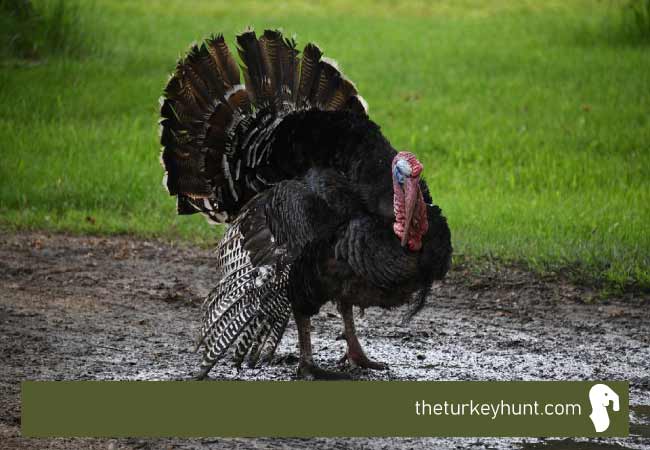
Different birds have different characteristics and behaviors. Knowing these is vital to a good hunt.
The Best Time To Hunt Turkeys Is Early In the Day
Go out in the early morning, well before sunrise. Don’t be lazy. The mornings are, by far, the best time of day to hunt for turkeys. This will give you plenty of time to look for an area with a lot of cover, such as trees and large bushes. The earlier you can get set, and stay quiet while you wait, the better.
Turkeys are, usually, far more active in the mornings, so if you want to get your best shot at one, start hunting early in the morning before they fly off for their roosts at sunset. If you’re going out with a group of people, plan to leave at least an hour before sunrise and return an hour or so after sunset. You want to get the most out of your hunt.
Know Your Land Plot Boundaries
Know your boundaries. This means that you need to know how far away you can shoot, where the birds are roosting, and where they will be traveling. This also means you need to avoid going onto private property by mistake.
You must hunt only in authorized locations. Do not get caught doing otherwise. It is not legal.
Get a Good Spotter
A good spotter will help you find where the birds are roosting, how many there are, and if they have been feeding recently. A spotter can also help you locate the best place to shoot. Having two pairs of eyes is best, plus it’s nice to have a buddy so you don’t get too bored while waiting around.
Knowing When To Shoot
While it may be tempting to shoot as soon as you see a massive tom, it’s important not to get too sloppy with your shots. There is always a chance that you could miss or injure the bird instead of killing it outright.
Most beginners struggle with this. As with calling, it just takes practice to figure out when the best shot you’re going to get will be.
Can You Turkey Hunt With a Bow?
Yes, you can absolutely go turkey hunting with a bow. If you haven’t been turkey hunting at all, try using your shotgun until you get the hang of things. While much more rewarding, using your bow is also very challenging. For your first few trips out looking for turkeys, use your shotgun so you can really focus on getting your calls down, and being as still as possible. Introducing a bow just adds a bit more of a challenge.
Mistakes to Avoid
If you’re a beginner turkey hunter, you may be feeling a little overwhelmed by everything that’s going on. No matter how experienced you are, there are some things that you can do to make your trip more enjoyable and successful.
Here are a few ideas:
- Make sure you have a tag. This can help you avoid a lot of hassles when it comes to the local authorities.
- Make sure that you don’t overcall, or move too much. Turkeys spook easily, and can usually tell when something is ‘off.’ Overcalling is one sure fire way to scare these birds away.
- Try hunting from a blind at first. It is much more forgiving, because it will shield most of the movement you make as a beginner.
Turkey Hunting Gear Needed For Beginners
First-time turkey hunters will need various pieces of turkey hunting gear to get started. The first thing that you should purchase is a good-quality shotgun. You can get good deals on used shotguns or buy a new one. Both pumps or semi automatics will work, but a pump action will require you to manually ‘pump’ the round into the chamber, which makes sound.
The next thing that you need to get is your turkey hunting call. You will use this to attract the birds to your location so that they come within range of your shotgun. A good call will allow you to get close enough to shoot them without spooking them away from your location.
Another essential piece of equipment for first-time turkey hunters would be a decoy bird. This will help draw the birds in close enough for you to make a clean shot. When a male turkey sees another male turkey in his general area, he can actually go in to try to kill it. Toms, or male turkeys, can be very aggressive during the spring mating season.
Finally, it would be wise to have some clothing and footwear on hand. Depending on the different seasons of turkey hunting you will be doing, the weather can get pretty extreme.
Summary – Turkey Hunting for Beginners
As you can see, there is a lot that goes into turkey hunting. Beginners will definitely struggle a bit, at first. This is completely normal and simply part of becoming a better hunter. As a beginner, work on your calling and minimizing movement.
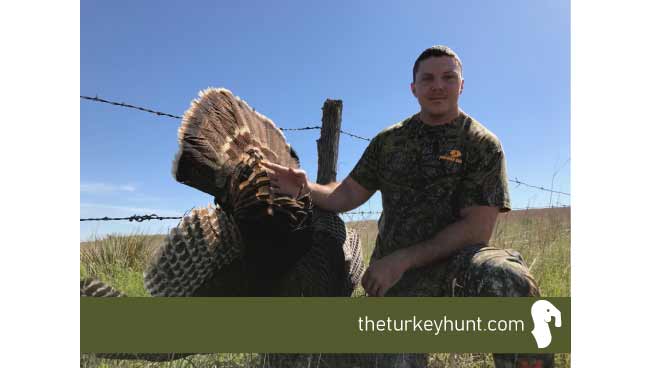
Also be sure to practice your shooting in the off season. If you can call in a bird, but cant shoot very well, you’re not going to be successful.
Related: How to Breast a Wild Turkey
Finally, make sure you are adequately prepared. Bring the right clothing, camo, accessories, and other pieces of gear you think you’ll need. This includes bringing plenty of water, too. Do not get caught out in the wilderness with no water. Too many hunters have heat strokes or get dehydrated every year because “they don’t think they’ll be out long enough to need extra water.”
If you take all of these steps, you’ll move from rookie turkey hunter to a more well rounded huntsman soon enough!

